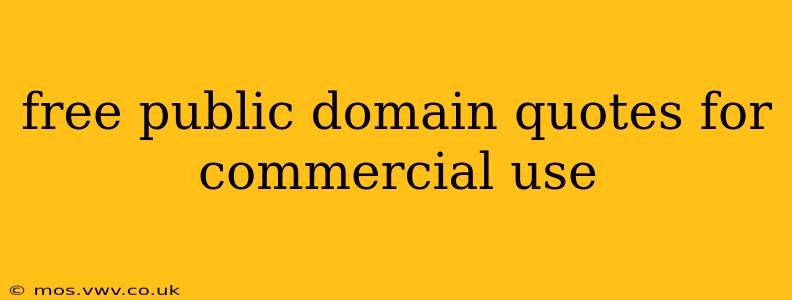Finding the perfect quote to enhance your brand, product, or marketing campaign can be a game-changer. But using copyrighted material without permission can lead to costly legal battles. Fortunately, a treasure trove of inspiring and impactful quotes resides in the public domain, free for commercial use. This guide explores the world of public domain quotes and how to leverage them effectively.
What are Public Domain Quotes?
A quote enters the public domain when its copyright expires. This generally happens after a certain number of years after the author's death (the exact timeframe varies by country and specific copyright laws). Once in the public domain, the quote is free for anyone to use without needing permission. This means you can use these words in your commercial projects, including websites, advertisements, marketing materials, and more.
How Can I Identify Public Domain Quotes?
Identifying quotes in the public domain requires a bit of detective work. Here are some key strategies:
- Check the copyright status: Research the author of the quote. If the author died a significant number of years ago (typically over 70 years in many countries), the quote is likely in the public domain. Websites dedicated to copyright information can be helpful resources. However, always double-check.
- Look for older sources: Quotes from ancient literature, historical figures, or works published long ago are often in the public domain. Classic literature and historical texts are excellent starting points.
- Use reputable quote databases: Several online databases specialize in compiling quotes, many indicating the copyright status. However, always verify the information independently.
Where Can I Find Free Public Domain Quotes?
Numerous online resources can help you find public domain quotes. Remember to always double-check the copyright status before use. Some reliable sources include:
- Project Gutenberg: This online library offers thousands of books in the public domain, many containing quotable passages.
- Bartleby.com: This website houses a vast collection of classic literature, including works with numerous famous quotes.
- Famous Quotes Websites: Many websites specializing in quotes often indicate whether a quote is in the public domain. Always cross-reference your findings.
What are Some Examples of Public Domain Quotes?
Many well-known quotes from history and literature are now in the public domain. Examples include:
- Shakespeare: A wealth of famous quotes from Shakespeare’s plays and sonnets are available.
- Mark Twain: Numerous witty and insightful quotes from Mark Twain’s works are now in the public domain.
- Abraham Lincoln: Lincoln's speeches and writings offer many powerful and memorable quotes.
- Ancient Philosophers: Quotes from philosophers like Plato, Aristotle, and Socrates are public domain.
Can I Change a Public Domain Quote?
Yes, you can modify or adapt a public domain quote for your use. This could include shortening it, slightly rewording it, or adapting it to your needs. However, ensure the changes don't significantly alter the meaning or create a misleading impression.
Do I Need to Attribute Public Domain Quotes?
While you don’t legally need to attribute a public domain quote, doing so is a best practice. Attribution adds credibility and shows respect for the original author. This is particularly important when your brand values integrity and transparency. A simple "—Author's Name" at the end is generally sufficient.
What if I'm Unsure About a Quote's Copyright Status?
When in doubt, err on the side of caution. Using copyrighted material without permission can result in legal issues and reputational damage. If you are uncertain about the copyright status of a quote, it's best to seek legal advice or choose a different quote from a reliable public domain source.
By carefully researching and using these resources, you can confidently incorporate powerful public domain quotes into your commercial projects, enriching your content and engaging your audience without legal risks. Remember: Responsible use and proper attribution contribute to the ethical and sustainable use of these valuable literary treasures.
